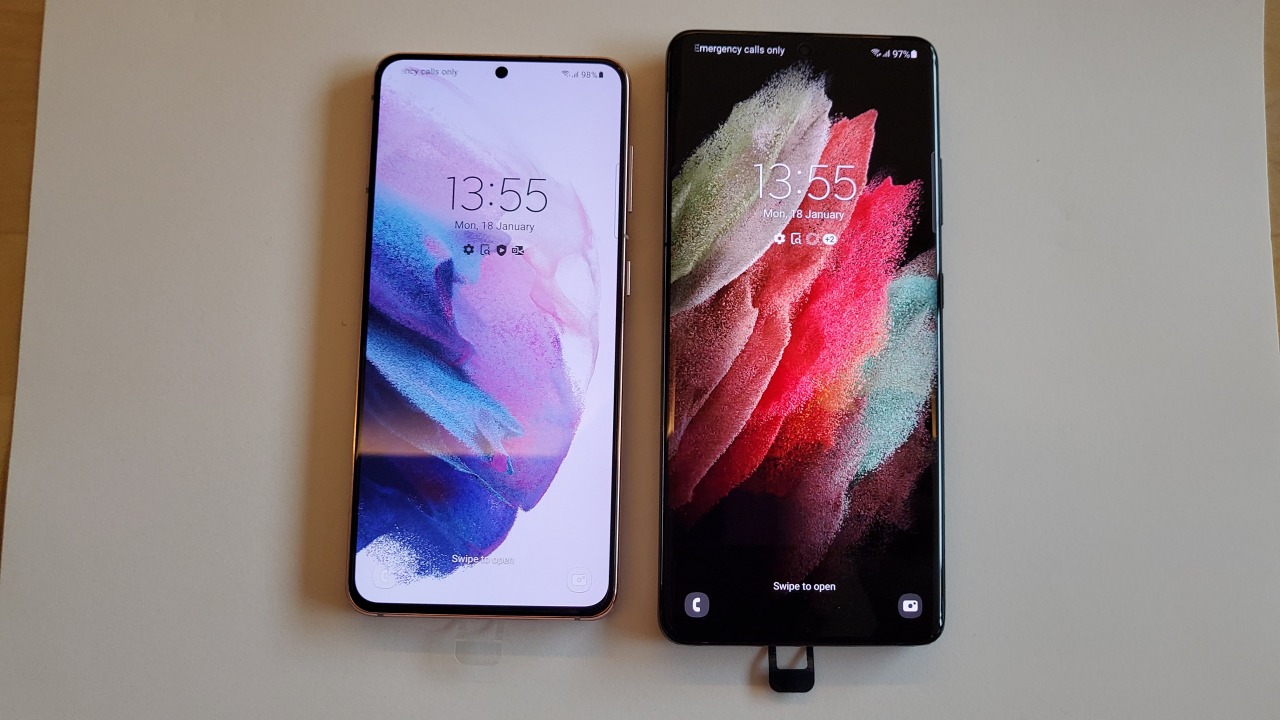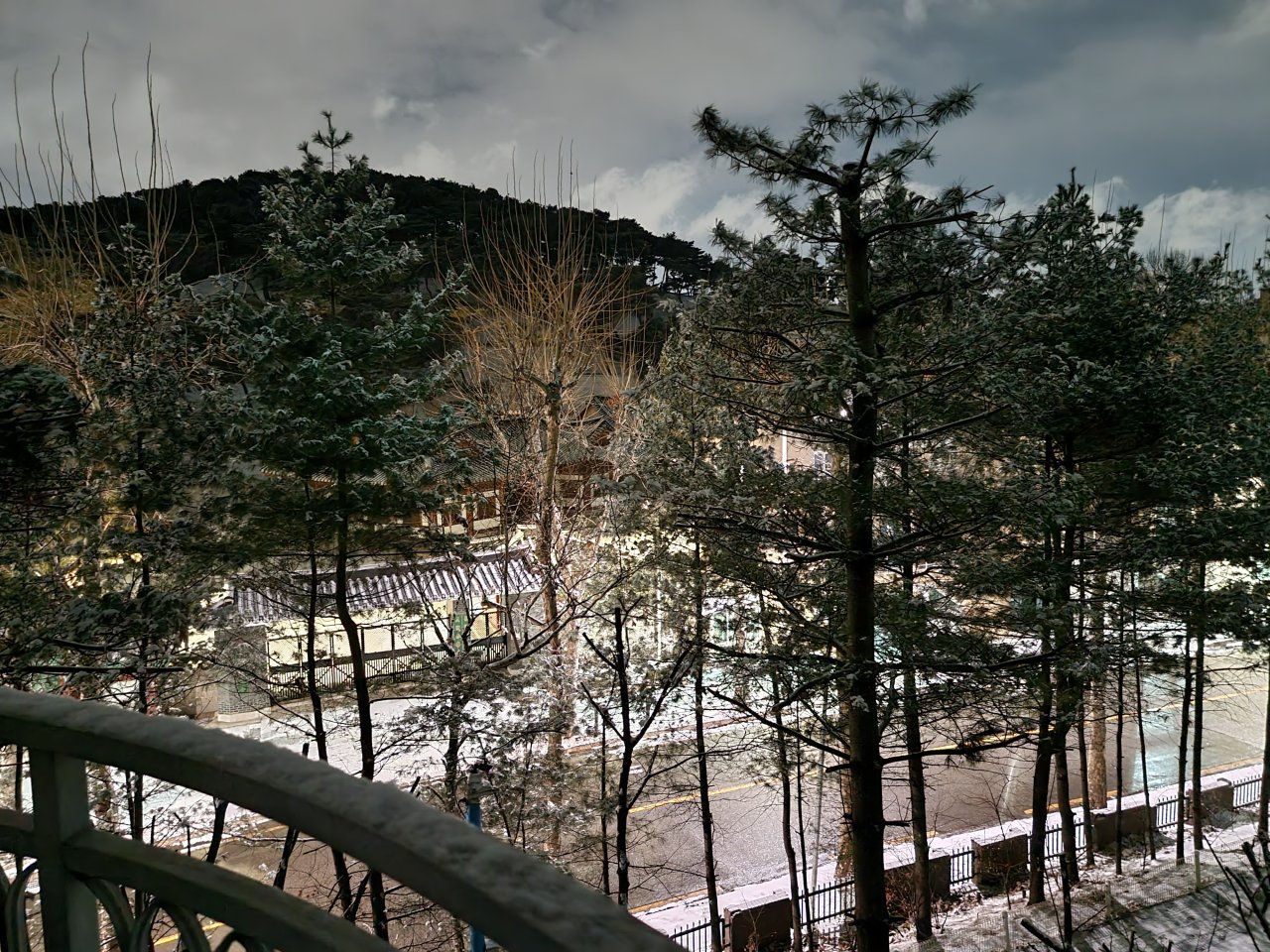 |
The front of the Galaxy S21 (left) and the Galaxy S21 Ultra (Song Su-hyun /The Korea Herald) |
Entry models are often a compromise for consumers, second-best to the fancy and expensive premium models. When it comes to Samsung Electronics’ latest smartphone lineup, however, that may not be the case.
With its sleeker design and slashed price tag, the Galaxy S21, the entry model in the latest series, immediately caught my attention. Then after getting my hands on it and the premium Ultra model over the weekend, I came to favor the cheaper phone over the extra-premium one.
The two gave out very different first impressions when I held them both at the same time -- one in each hand.
First of all, the 169-gram S21 model felt much more like an Apple device than a typical Samsung phone.
Personally, I found that the metal body side of the phone with its 6.2-inch flat AMOLED display gave a grip that was extremely compact in one hand, feeling light but firmly staying in my palm at the same time.
On the contrary, the 6.8-inch S21 Ultra model, weighing 227 grams, was notably bulkier, and the curved edge screen gave me the feeling that it might slip out of my hand.
The Ultra’s rear camera module was still protruding and didn’t lie flat.
Meanwhile, the striking design change on the S21 device, called “Contour Cut camera housing,” left its camera still sticking out, but much less than its predecessor. This external change could be a primary reason for a purchase, as it has given the phone a sleeker aesthetic.
There have been pros and cons of Samsung’s signature curved edge screen for its Galaxy devices over the past decade.
For grip, the flat screen provided more firmness and steadiness. And for the viewing experience, I personally found the flat screen much sharper, clearer and more comfortable than the edge screen, regardless of size.
Compared with the Full HD+ display on the S21, the Quad HD+ display -- with a resolution of 3,200 by 1,440 and an adaptive refresh rate of 10 to 120 hertz -- felt smoother, faster and more vivid when streaming video content.
But the S21 display, which has a refresh rate of 48 to 120 hertz, was as great as the Ultra’s, except for the very subtle difference in color contrast in my view.
When I opened Google Maps on both devices and found my locations at the same time, the S21 screen was neck-and-neck with the Ultra in terms of smoothness and speed.
However, when it comes to photography, the Ultra definitely had an impressive edge over the S21.
Taking photos at night wasn’t my thing, so I didn’t have any expectations of the Galaxy S21 Ultra. But I couldn’t keep my jaw from dropping when I saw what I captured last night from my balcony.
I took several shots of my woody neighborhood with few streetlights in the wee hours of Monday with both the S21 and the Ultra.
Both produced flawless pictures of a snowy winter night, but the Ultra pictures turned out noticeably sharper and brighter, and more unrealistic.
 |
Night mode photos taken with the Galaxy S21 Ultra (Song Su-hyun/The Korea Herald) |
 |
Night mode photos taken with the Galaxy S21 (Song Su-hyun/The Korea Herald) |
Over the past few years I used to prefer larger smartphones for a wider viewing experience and better camera performance.
I always passed over the entry models of Galaxy phones. But this time, the Galaxy S21 with its 999,900 won ($905) price tag and better-than-expected quality of the display and camera in comparison with the 1.59 million won Galaxy S21 Ultra has won my heart.
By Song Su-hyun (
song@heraldcorp.com)







![[Herald Interview] How Gopizza got big in India](http://res.heraldm.com/phpwas/restmb_idxmake.php?idx=644&simg=/content/image/2024/11/20/20241120050057_0.jpg)


![[KH Explains] Dissecting Hyundai Motor's lobbying in US](http://res.heraldm.com/phpwas/restmb_idxmake.php?idx=644&simg=/content/image/2024/11/20/20241120050034_0.jpg)